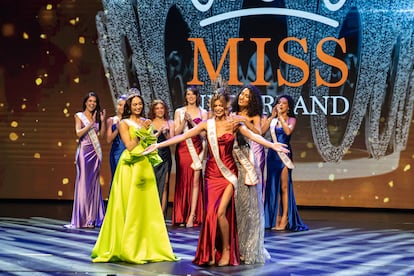Rikkie Kolle, the first trans woman to be crowned Miss Netherlands: ‘With this title, I have a greater opportunity to speak up for my community’
After her victory this past Saturday, the 22-year-old model – who will represent her country at the 72nd annual Miss Universe Pageant in El Salvador – has set out to be the example that she never had during her childhood. ‘We’re in 2023, it’s time to normalize this’

Dressed in red, wearing a crown and greeting the public… especially her family and friends, who applauded delightedly in the front row. This is the image that Rikkie Kolle – the new Miss Netherlands – treasures from her victory in the pageant, held on Saturday, July 8.
At 22 years old, her triumph at this stage of the Miss Universe pageant is particularly special. This is because Kolle is a transgender woman – the first to ever have won this competition in her country. Her victory is the starting point of her mission to support her community. She has set out to be the example that she never had during her childhood.
Miss Universe has been accepting trans candidates since 2012. The first to win a national contest was Ángela Ponce, from Spain, in 2018.
Kolle spoke with EL PAÍS via videoconference, amidst a whirlwind of interviews and preparations for the year ahead. She considers herself to be “a strong and empowered woman” – one who is thinking about how to approach the increased visibility she now has. She wants to be a role model for her community “on social media” and “maybe also in schools.” It will take her some time to get organized, she admits, but one thing is clear:
“I don’t think you can push someone to be trans. You don’t become trans – you’re [trans] from the moment you’re born. That’s how I feel.”
She wears a white dress and lets her blonde hair loose during her interview. The ease with which she expresses herself reinforces her message for trans youth: “You have to realize for yourself that you didn’t come into the world as you know you are.”
Born in Hoorn and raised in Den Helder – two towns in northern Holland – she knew who she was from a young age. Her parents realized that their son – Rik – was different from other boys when he was eight-years-old. At that age, she went with them to a polyclinic for trans cases in an Amsterdam hospital: “They asked me a lot of questions [and gave me many] tests to make sure I was ready to tackle the long journey of going from man to woman. The waiting lists are now three years long.”
Her path to transition began at the age of 10, and she finally underwent her major transformative operation in January of 2023. She shared that moment on her Instagram account, where she has accumulated over 37,000 followers. “[I shared it] because it’s a journey that never ends… [I was] proud of having come this far,” she sighs. “We’re in 2023 and it’s time to normalize this.”

Despite support from her family and her school, there have been very difficult moments that she cannot forget. Like when she started introducing herself as “Rikkie” in primary school, which caused confusion among the other children. “Kids don’t understand these changes… it’s not that I got bullied, but they didn’t understand,” she recalls. In high school, a teacher – whom she still clearly remembers – said unkind things to her. “I wasn’t one of her favorite students and her incomprehension and attitude showed me that I had to get over it, I had to be stronger.”
At the age of 17, in 2018, she participated in a modelling contest: Holland’s Next Top Model. There, she was told that she had the talent required for the profession. In 2019, she reached the finals of another competition in the field, Elite Model Look. “I really like [modelling]... but with the pageantry, I have the right to speak. I can speak about trans rights here in the Netherlands, I can be there for my community.”
After a period of freelance modelling in Amsterdam, she moved to Breda, in the south, where she has good friends. “Den Helder is very small (it has 56,000 inhabitants) and there was no other woman like me. I studied Marketing and Communications and my friends from the LGTBI community are in Breda today. I feel at home there.”

Since she was crowned Miss Netherlands last weekend, congratulatory messages have poured in… as have negative ones. On social media, there has been a wave of comments by those who say that she isn’t a “real woman.” Others sneer that she triumphed precisely because she’s transgender.
“I’m proud to be a trans woman, to be Rikkie and to be myself. I want to combine it all into one woman,” she laughs, in response to the personal attacks. The jury of the Dutch contest has described her as having a “firm and clear mission,” noting that her contributions as Miss Netherlands can be “very valuable.”
When asked how she felt while she was competing for the crown, she replies: “[The organizers] asked, ‘Are you going to feel safe with us?’ And I really felt amazing. I answered ‘of course, yes.’ And from that moment, I knew this was going to be my destiny.”
The Miss Universe pageant is scheduled to take place in December, in El Salvador. She hopes that the atmosphere will be as welcoming as in her home country, where she has become friends with some of the other finalists. “The most important thing is friendship, enjoying yourself and having good memories. But everyone wants to win, of course,” she admits with a laugh.
The Miss Universe pageant dates back to 1952. The change in regulations that allowed for the admittance of transgender contestants occurred when it was owned by former US President Donald Trump. Since 2022, the owner is Anne Jakkaphong Jakrajutatip, a Thai businesswoman who is also trans. She has been promoting Miss Universe as an inclusive organization, one that is capable of evolving with the new generations.
Sign up for our weekly newsletter to get more English-language news coverage from EL PAÍS USA Edition
Tu suscripción se está usando en otro dispositivo
¿Quieres añadir otro usuario a tu suscripción?
Si continúas leyendo en este dispositivo, no se podrá leer en el otro.
FlechaTu suscripción se está usando en otro dispositivo y solo puedes acceder a EL PAÍS desde un dispositivo a la vez.
Si quieres compartir tu cuenta, cambia tu suscripción a la modalidad Premium, así podrás añadir otro usuario. Cada uno accederá con su propia cuenta de email, lo que os permitirá personalizar vuestra experiencia en EL PAÍS.
¿Tienes una suscripción de empresa? Accede aquí para contratar más cuentas.
En el caso de no saber quién está usando tu cuenta, te recomendamos cambiar tu contraseña aquí.
Si decides continuar compartiendo tu cuenta, este mensaje se mostrará en tu dispositivo y en el de la otra persona que está usando tu cuenta de forma indefinida, afectando a tu experiencia de lectura. Puedes consultar aquí los términos y condiciones de la suscripción digital.








































